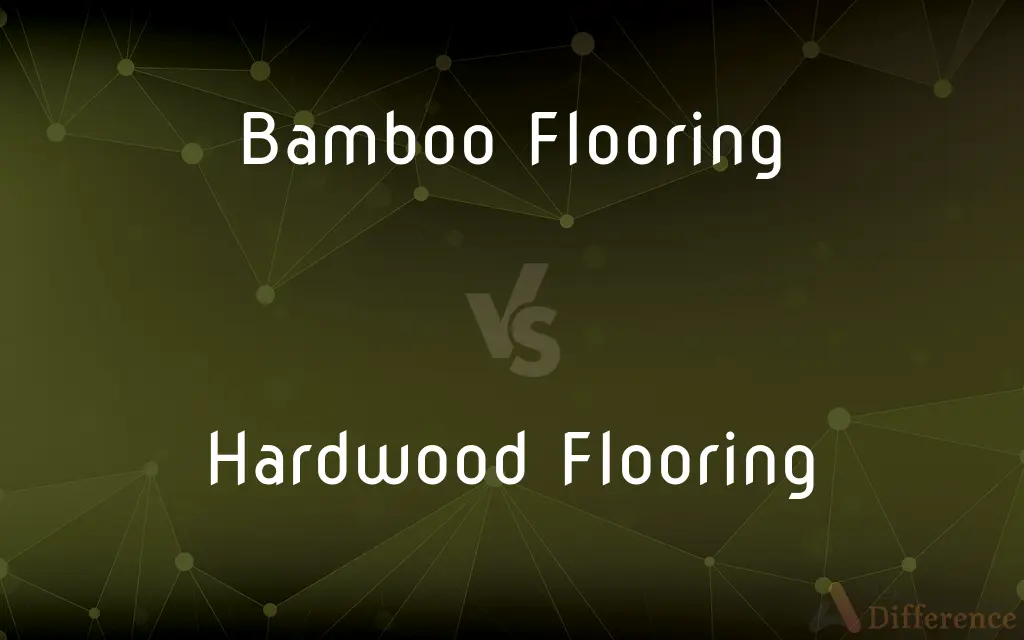Bamboo Flooring vs. Hardwood Flooring — What's the Difference?
By Tayyaba Rehman & Fiza Rafique — Published on February 14, 2024
Bamboo Flooring is made from bamboo, offering sustainability and rapid renewability. Hardwood Flooring is crafted from harvested trees such as oak and maple, known for its durability and classic look.

Difference Between Bamboo Flooring and Hardwood Flooring
Table of Contents
ADVERTISEMENT
Key Differences
Bamboo Flooring and Hardwood Flooring are two popular choices for homeowners looking for natural and durable flooring options. Bamboo flooring is derived from the bamboo plant, which is actually a type of grass, making it a highly renewable resource. It can mature and be ready for harvest in as little as five years, offering a more sustainable flooring option. Bamboo floors come in a variety of styles and finishes, ranging from natural tones to darker stains achieved through a process called carbonization.
Hardwood Flooring, on the other hand, is made from harvested trees such as oak, maple, and walnut. These trees take decades to reach maturity, making hardwood a less renewable resource compared to bamboo. However, hardwood floors are prized for their durability, timeless appearance, and the way they add warmth and value to a home. Each type of wood offers a unique grain pattern and color, allowing for a wide range of design aesthetics.
When it comes to durability, both flooring types offer strong options, but the hardness can vary significantly. Bamboo's durability depends on the type, with strand-woven bamboo being the hardest and most durable, comparable to or even surpassing some hardwoods. Traditional hardwood floors, depending on the species, can offer a range of hardness levels as measured by the Janka hardness test, with certain species like hickory and oak known for their resilience.
Installation methods for bamboo and hardwood floors can be similar, including options for glue-down, nail-down, and floating floor installations. Both types of flooring can also be refinished, though the ability to refinish bamboo floors, especially those that are strand-woven, may be limited compared to hardwood floors due to the material's density and the presence of adhesives in the planks.
In summary, the choice between bamboo and hardwood flooring often comes down to personal preference, environmental considerations, and budget. Bamboo offers a unique, eco-friendly flooring solution with a modern look, while hardwood offers timeless appeal and proven durability.
ADVERTISEMENT
Comparison Chart
Material Source
Bamboo plant (grass)
Hardwood trees like oak, maple
Renewability
Highly renewable, matures in 5 years
Less renewable, trees take decades to mature
Durability
Varies, strand-woven is highly durable
Varies by species, generally very durable
Aesthetic Variety
Natural to carbonized tones
Wide range of grains and colors
Environmental Impact
Lower, fast regrowth rate
Higher, slow tree maturity
Compare with Definitions
Bamboo Flooring
Can be harder than some hardwoods when strand-woven.
Our strand-woven bamboo flooring resists scratches from our pets.
Hardwood Flooring
Wide variety in grain patterns and colors.
We love the unique grain patterns of our walnut hardwood flooring.
Bamboo Flooring
Limited ability to refinish compared to hardwood.
Be mindful that bamboo flooring might not refinish as well as hardwood.
Hardwood Flooring
Can be refinished multiple times.
The ability to refinish the hardwood flooring makes it a lasting choice.
Bamboo Flooring
Rapidly renewable, maturing in about five years.
Opting for bamboo flooring supports sustainable home design.
Hardwood Flooring
Takes decades for source trees to mature.
Choosing hardwood flooring means selecting a less renewable resource.
Bamboo Flooring
Offers a modern look with various finishes.
The carbonized bamboo flooring adds warmth to our kitchen.
Hardwood Flooring
Known for timeless appeal and adds value to homes.
Our investment in hardwood flooring significantly increased our home's market value.
Bamboo Flooring
Eco-friendly flooring made from bamboo.
We chose bamboo flooring for its green credentials.
Hardwood Flooring
Durable flooring made from various hardwood trees.
The oak hardwood flooring elevates the elegance of our living room.
Common Curiosities
Do bamboo floors contribute to deforestation?
No, bamboo is a grass that grows quickly and does not contribute to deforestation.
Are bamboo floors cheaper than hardwood floors?
Generally, bamboo floors can be less expensive, but prices vary widely.
Can bamboo flooring be used in commercial settings?
Yes, especially strand-woven bamboo, due to its durability.
How do I care for bamboo and hardwood floors?
Both require regular sweeping and occasional damp mopping with appropriate cleaners.
Are bamboo floors water-resistant?
Bamboo is more water-resistant than traditional hardwoods but still susceptible to water damage.
Do bamboo floors fade over time?
Yes, like hardwood, they can fade with prolonged exposure to direct sunlight.
Which is more environmentally friendly, bamboo or hardwood flooring?
Bamboo flooring, due to bamboo's rapid renewability.
Which flooring type is more durable?
Durability varies; strand-woven bamboo is comparable to the hardest hardwoods.
Can both bamboo and hardwood floors be refinished?
Yes, but bamboo may have limitations depending on the type.
Can I install bamboo or hardwood floors in a bathroom?
Caution is advised due to moisture, though some engineered options may be suitable.
Which flooring type offers more variety in appearance?
Hardwood flooring typically offers a wider variety of grains and colors.
Is bamboo flooring suitable for pets?
Yes, especially strand-woven bamboo, which is more resistant to scratches.
How long does bamboo flooring last compared to hardwood flooring?
Both can last decades with proper care, though hardwood may have a longer lifespan.
Can hardwood floors be installed over radiant heating?
Yes, but it's best to choose engineered hardwood for this purpose.
Which is better for allergy sufferers?
Both are good options as they don't harbor dust and allergens like carpet.
Share Your Discovery

Previous Comparison
Harvard University vs. Stanford University
Next Comparison
Scuba Diving vs. SnorkelingAuthor Spotlight
Written by
Tayyaba RehmanTayyaba Rehman is a distinguished writer, currently serving as a primary contributor to askdifference.com. As a researcher in semantics and etymology, Tayyaba's passion for the complexity of languages and their distinctions has found a perfect home on the platform. Tayyaba delves into the intricacies of language, distinguishing between commonly confused words and phrases, thereby providing clarity for readers worldwide.
Co-written by
Fiza RafiqueFiza Rafique is a skilled content writer at AskDifference.com, where she meticulously refines and enhances written pieces. Drawing from her vast editorial expertise, Fiza ensures clarity, accuracy, and precision in every article. Passionate about language, she continually seeks to elevate the quality of content for readers worldwide.













































